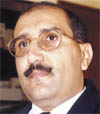Dr. Rashad Al-Aleemi: “Any lapse in security is bound to affect Yemen’s development and political stability.” [Archives:1998/03/Interview]
Dr. Rashad Al-Aleemi is currently the Director of General Security in Taiz. He previously occupied several posts including a lecturer at the Department of Sociology in Sanaa University and the Director-General of the Nationality and Passport Authority within the Ministry of Interior. Al-Aleemi received his Ph.D. in sociology from Egypt. He published two books: “Tribal Arbitration” and “Traditionalism, Modernity and the Yemeni Legal System.” Yousuf Al-Shareef of Yemen Times met Dr. Al-Aleemi in Taiz and filed the following interview.
Q: How do you rate the level of security in Taiz? A: I can confidently say that the level of security in Taiz is quite satisfactory. The number of felonies and crimes has markedly decreased. Major crimes, according to the definition of the law, have become rather rare. We have special security plans for almost every eventuality. During the Holy month of Ramadhan, for instance, we are implementing previously set security plans at the levels of Taiz city and the Taiz governorate as a whole. Full coordination is implemented among all security units in Taiz, and information coming from the Ministry of Interior is collated and re-distributed to all police stations in Taiz. You can ask any citizen and he or she will attest to the good level of security in the area where he or she lives. Policemen, on foot and in cars, patrol all areas of Taiz, day and night. Particular, pre-planned security measures are taken according to the occasion. So I can say again that I am very satisfied with the level of safety and security in the Taiz governorate.
Q: What sort of security problems do you face in Taiz? A: Like many other state organizations, the security apparatus faces its own obstacles and hindrances. But due to the special importance of this sector, constant attention has been provided by President Ali Abdullah Saleh to security issues, which makes us always able to surmount any problems we are likely to face. As you may very well know, any lapse in security is bound to reflect negatively on Yemen’s development process and political stability. On this occasion, I’d also like to thank the Ministry of Interior for their great concern and full participation in solving the problems we and other security organs face all over Yemen. There are more than a quarter of a million people living in Taiz. Almost everyone of these people has his or her own political, economic, or social activity, a small proportion of which is likely to cause one sort or another of security problems. So it is inevitable that law breaches and other security problems should always occur. The available financial resources are, unfortunately, not enough. I hope that the 1998 budget will solve such financial difficulties. Other problems we face are part of the Yemeni society’s general life, which often hinder its progress and development. These problems include traffic accidents, land disputes, carrying firearms, etc. The Taiz landscape, being mountainous, often makes it hard for policemen to chase after escaped criminals. However, we try to do our utmost to protect the safety and security of the citizens, despite the lack of funds and shortage in manpower. Our priority is to anticipate crime and try to prevent it before it occurs.
Q: What are the most prevalent crimes in Taiz? A: The major crimes that are somewhat widespread include murder – premeditated and manslaughter, highway robbery, and burglary. These three types of crime represent a major challenge. The reasons for the prevalence of such crimes include the widespread use of firearms, lengthy court procedures which frustrate many people, and long-running unresolved land disputes which make many people use force to settle them. The issue is primarily a social one. It is not just a matter related to the judicial system or the prosecutor’s office. For example, the area of arable lands available in Taiz is quite limited, so land disputes are rather common, which often leads to crimes such as murder. This problem must be tackled. We are now imposing restrictions, according to the current law, on carrying firearms. Such measures can be developed in the future under a new firearms law.
Q: How do you deal with the Taiz prison administration? A: There are rules and regulations that govern the relation among the security apparatus, the prosecutor’s office, and the prison authority. From the legal point of view, prisons are governed by the prosecutor’s office. We have jails for temporary detention for a limited period of time – 24 hours – as specified by law. When the 24-hour period is over, it is renewed by the prosecutor if more evidence is required in the case. We, however, provide prisons with many services such as food, health care, social care, education, and vocational training. We provide prisons with these services because they are still part of the Ministry of Interior, administratively and financially. But as far as imprisonment is concerned, the prosecutor’s office and the courts are responsible. We are strictly not allowed to put anyone in prison.
Q: Does this mean that you are not aware of the conditions in prisons? A: There is a difference between being aware of prison conditions and who has the legal authority to put people in prison. We cannot put people in the Central Prison because we do not have the authority to do so. Only the prosecutor and the court have such a legal power. Our task is to provide prisoners with social and health care and take care of their interests when family visits are concerned. Our public relations representative makes regular visits the prison to get to know the social problems the prisoners face. During 1997, we were able to make many achievements in the Taiz Central Prison such as establishing a big workshop for vocational training (funded by Hajj Ahmed Abduallh Al-Sheibani) and building a mosque at the women’s prison (funded by the Hayil Saeed Anam Charitable Society). There is also a school for teaching Qura’an and five teachers working in the prison on daily basis. A female teacher is now available for the women’s prison. We will also establish a sewing workshop which is almost ready now. So as you can see, we provide the prison with many services because we are administratively responsible for it.
Q: Do you have plans to train security personnel? A: Major training plans are prepared by the Ministry of Interior itself. Our officers are trained at the High Police Institute in Sanaa which is run be the Ministry of Interior. However, we have our own smaller plans to provide simple training procedures. We organize specialized training courses every year. For example, three such training courses were held last year in Taiz for wire and wireless communications, operations, and a training course for some of the Central Security personnel who had not gone into training courses for a long time. We are planning more training courses in the future which will be in computer, management and secretarial work, and other important skills. The problem, though, is that budget allocations are still centrally made with little money going to other governorates. The Minister of Interior, Dr. Hussein Mohammed Arab and other senior officials in the ministry had met in Sanaa and decided in principle that the governorates should be given part of the budget allocated for training so that they will be able to conduct simple training courses.
Q: Could you tell us a bit about combating begging? A: The Society to Combat Begging was established last year upon a suggestion by the journalist, Mr. Ali Al-Sheibani. The idea was adopted by the Governor of Taiz, Mr. Abdullah Al-Hojari, in cooperation with the Hayil Saeed Anam Charitable Society, especially Sheikh Abduljabbar, Mr. Ahmed Hayil Saeed, and Mr. Ali Abdu Seed. These gentlemen formed a preparatory committee in which I participated. An administrative panel and a consultative council were later elected. The latter is headed by the Governor of Taiz with the participation of the security council, prominent social figures, and members of parliament. The number of beggars was determined with assistance by the Sanaa University students who did the field survey. The Hayil Saeed Anam Charitable Society funded this project. Mr. Al-Sheibani, Mr. Abdullah Saeed, and the rest of the administrative panel went specially to Himms, Syria to get a first-hand knowledge of a similar society there. The society now has its own offices, and it provides various kinds of assistance to beggars and other needy people. The Society to Combat Begging also studies the cases of individual beggars in order to be able to address each case separately. I cannot say that all beggars in Taiz have been identified and dealt with, but the number of beggars has considerably decreased. Every participant in this activity is very enthusiastic, so I am very confident that it will achieve bigger successes in the future. The experiment also needs to be evaluated regularly so as to be able to build on the information we have. Some people take up begging as a profession. When the society confirms that a particular beggar has a lot of money and does not need to go begging in the streets, or they have successfully dealt with his or her case, they notify us. This is a very good step, but we are still at the beginning of the road. I hope that the idea will be adopted in other governorates.
——
[archive-e:03-v:1998-y:1998-d:1998-01-19-p:./1998/iss03/intrview.htm]


